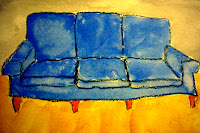 I hadn't been back to my meditation bench in ages, so this morning, I decided to sit awhile. The bench was difficult to find in the underbrush.
I hadn't been back to my meditation bench in ages, so this morning, I decided to sit awhile. The bench was difficult to find in the underbrush. ...how great it is to have her home after her first year of college—and yet, I've already wrecked it. I vowed before she arrived, not to give advice, not, unless she asked for it. But there I was the other day, driving around in the car, telling her what she should do, what she should say, and, worst of all, how she should act! The response wasn't good. A nineteen-year-old doesn't want parental advice. How could I have forgotten from my days of avoiding my parents at all cost, just so they wouldn't ask me questions about my life or try to share their feelings? College kids have experienced enough of the world to get along without outside interference. By this age, parents aren't necessary, except to pay the bills and keep the light on at night. It's not a personal thing, I keep telling myself; it's a cruel reality, one I'm having trouble accepting.
~~~
Another cruel reality is the one that's unfolding in the Gulf of Mexico. I'm no engineer and I certainly don't know a rat's ass from an off-shore drilling rig, but I've joined the millions of people who are fed-up and angry about BP's response to the oil spill. According to Andrew Revkin, the blogger who writes for "Dot Earth" in the NY Times, it's time for the federal government to step in and push BP aside, to stem the flow of oil. Comments on his blog yesterday ranged from "way to go," to "you don't know what you're talking about," to "it's all Obama's fault," to "no one knows what they're talking about."
Pelicans trying to land as oil hits shore (photo credit: media3.washingtonpost.com)
And then there's Tom's p.o.v., which I've been thinking a lot about lately. We were in the back yard looking at his artichokes (you can check them out on Flickr), and talking about BP's failed containment attempts. He pointed way off in the distance to the Griffith Park Observatory, five miles away, about the distance the oil is spewing out of the earth, and said, it would be like aiming for that spot and trying to hit it...under water, impossible to do.
His point: we're deluding ourselves thinking we can drill without triggering a disaster, drilling deep into the earth, cutting into flesh without it bleeding. We've allowed exploration five miles down with no idea of the consequences, no proven solutions if things go wrong, all the while allowing powerful oil companies protection by sweetheart deals and handshakes from regulators and politicians, as reported in the LA Times this morning.
We Angelenos keep driving our cars because we live in a city that can't seem to envision a workable public transportation system— like they have in Europe or in New York— to get us from one side of the city to the other. (Yes, I know the argument for taking the bus, but my job is near the Beverly Center and I can't spend two hours getting there and then two back, even though the poor of this city must, and do, do it, but I can't, I won't, and that's why I keep driving). And the circle remains unbroken, and we keep spinning our wheels and drilling for oil to feed our cars, harming every living thing in its path.
His point: we're deluding ourselves thinking we can drill without triggering a disaster, drilling deep into the earth, cutting into flesh without it bleeding. We've allowed exploration five miles down with no idea of the consequences, no proven solutions if things go wrong, all the while allowing powerful oil companies protection by sweetheart deals and handshakes from regulators and politicians, as reported in the LA Times this morning.
We Angelenos keep driving our cars because we live in a city that can't seem to envision a workable public transportation system— like they have in Europe or in New York— to get us from one side of the city to the other. (Yes, I know the argument for taking the bus, but my job is near the Beverly Center and I can't spend two hours getting there and then two back, even though the poor of this city must, and do, do it, but I can't, I won't, and that's why I keep driving). And the circle remains unbroken, and we keep spinning our wheels and drilling for oil to feed our cars, harming every living thing in its path.















